Protests By Workers, Professionals Continue In Iran
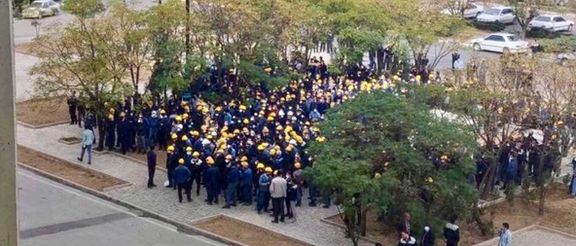
Workers' protests are continuing across Iran's government buildings as grievances fail to be addressed by the regime amid dire poverty.

Workers' protests are continuing across Iran's government buildings as grievances fail to be addressed by the regime amid dire poverty.
US-based Human Rights Activists News Agency (HRANA) reported that a group of farmers staged a demonstration on Saturday in front of the governorate building in Isfahan (Esfahan), central Iran.
The protest showed the desperation of the community who have been ignored over the years. Multiple regions across Iran have witnessed protests from farmers in recent years with data from the Iranian Statistics Center last year reporting that a quarter of the country's farmers had faced unemployment over the past seven years.
Simultaneously on Saturday, temporary contract employees of the ministry of oil gathered for a protest in front of the National Iranian South Oil Company in Ahvaz, demanding an increase in salaries.
In western Iran, a group of nurses in Eslamabad-e Gharb held a protest at a hospital. Additionally, in central Iran, nurses gathered in front of the governorate building in Yazd, expressing dissatisfaction with the lack of attention to their demands.
Nurses, protesting delayed increases for over a year, are now demanding a raise in their wages. On Saturday, the Iranian state news agency IRNA quoted Shamseddin Shamsi, a member of the Supreme Nursing Council, stating that there is a shortage of over 30,000 nurses in the country.
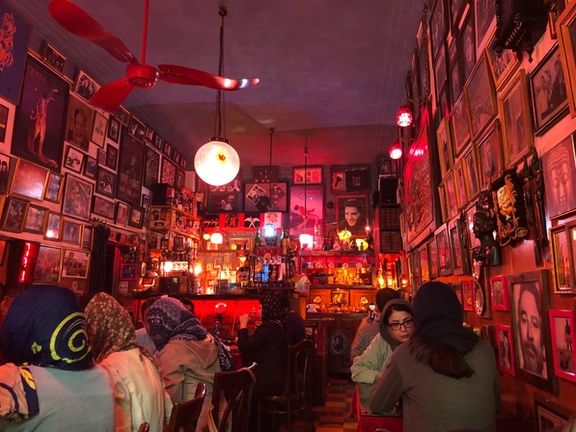
Amidst tightening hijab laws, numerous cafes and bookstores in Tehran, Mashhad, Tabriz, and a range of other cities in Iran have been closed.
In Alborz province, the police commander of Savojbolagh, Ali Soleimani, announced the closure of 9 out of 12 traditional cafes and restaurants visited during the implementation of the "Social Security Plan."
Simultaneously, in Semnan province, 23 shops were closed for "failure to observe Islamic norms."
In Esfahan province, police sealed two restaurants and four hair salons in the city for Falavarjan for “non-compliance with compulsory hijab” under the "Social Security Plan."
The wave of closures continues in Mashhad, where, in recent months, numerous cafes have been sealed for failure to observe compulsory hijab. On Tuesday, law enforcement commanders sealed Gorilla Café, a recently opened establishment. Meanwhile, Bakhtiari Café in Tabriz was sealed on November 11 by supervisory authorities for "failure to observe compulsory hijab."
A police official from Eslamshahr in the vicinity of Tehran revealed Saturday the closure of 121 shops and the confiscation of over 500 vehicles in the city due to non-compliance with compulsory hijab.
Hijab police have also been ramped up in Tehran metro stations.
The ongoing crackdown on women removing compulsory hijab, intensified after the death of Mahsa Amini during her detention by the morality police, has gained momentum.
The closure of commercial, business, and tourist facilities, hotels, administrative establishments, as well as internet companies, reflects the Iranian regime's inability to deal with women who defy hijab.

The Islamic Republic's government has warned travel agencies in Iran against marketing tours abroad featuring concerts by California-based Iranian pop singers.
The directive, issued by the General Directorate of Cultural Heritage, Tourism, and Handicrafts of Tehran Province, targets tours marketed by Iran-based agencies that include performances by diaspora singers that usually take place in neighboring countries. The action highlights a growing tension between the Iranian authorities and artists from the diaspora.
In the recent letter directed to travel and tourism agencies in Tehran, Parham Janfeshan, the director-general of cultural heritage, tourism in Tehran Province, expressed concerns about certain travel agencies advertising and selling tickets for concerts by certain singers, including those from Los Angeles. The communication underscored the importance of adherence to “Islamic values” and warns against potential violations.
The warning includes threats that the travel offices involved in the promotion and sale of services related to these concerts will be referred to a special committee for decision on possible penalties.
Hormatollah Rafiei, the head of the guild for Travel Service Offices and Tourism, warned against violations and emphasized that travel agencies operating permits exclude the right to promote these concerts.
Since the Revolution in 1979 -- when pop music was declared "haram" (forbidden) by the founder of the Islamic Republic Rouhollah Khomeini, Iranians have found ways to follow pop music they love. With domestic performances restricted to a very narrow type of regime-approved songs, a vibrant tradition emerged – Iranians began to travel to nearby countries to attend concerts by their favorite singers from the diaspora.
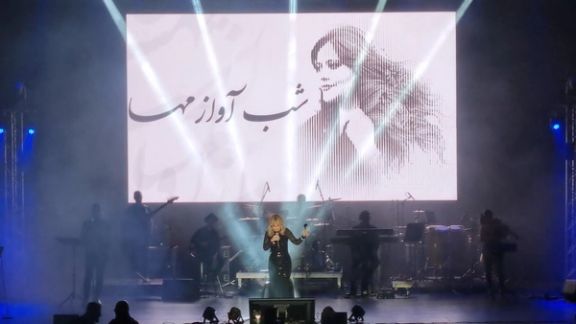
Primarily based in Los Angeles, these Iranian-American pop stars, barred from performing in their homeland, draw substantial crowds during tours in countries like Turkey, the UAE, Azerbaijan, Georgia, Armenia, and Erbil in Iraqi Kurdistan. These destinations are financially more affordable for Iranians, with fewer visa requirements.
The Los Angeles region is home to the world’s largest Iranian community outside of Iran and has been a scene of anti-Islamic Republic protest rallies especially since the start of the Women, Life, Freedom movement. There are about 400,000 Iranian-born immigrants in the United States and their children. More than a third of them live in the Los Angeles metropolitan region, according to data from the Migration Policy Institute.
Iranian pop stars enjoy significant popularity also among expatriates in European countries. Singer-songwriters Shahin Najafi and Mohsen Namjou are noteworthy artists based in Europe, boasting a sizable fan base of Iranian expatriates.

The popularity of foreign-based artists surpasses that of their Iran-based counterparts, forming a global community of Iranian music enthusiasts who overcome travel obstacles to enjoy performances prohibited in their country. To gauge their popularity, one can contrast Iranians spending an average of $200 per ticket for concerts by Iranian stars like Ebi, Dariush, or Googoosh in Turkey or Dubai with the popularity of international stars like Taylor Swift and Beyoncé. In Iran, concert tickets typically range from $5 to $10.
Warnings against going to such concerts were issued in previous years when these events were more regularly organized in neighboring countries. However, the recent campaign underscores an escalating divide, intensified by last year's Women, Life, Freedom protests. The nationwide revolt, sparked by the death in custody of 22-year-old woman Mahsa Amini, saw numerous exiled Iranian stars rallying behind the people and denouncing the regime's suppression of dissent.
The majority of these singers utilized their concerts as a platform to amplify the voices of Iranian protesters globally. Concerts by Iranian expatriates commonly featured images of iconic protesters harmed, detained, or killed by Iran's security forces, accompanied by chants against the Islamic Republic.
Iranian state-run media has consistently published reports criticizing the so-called Los Angeles singers, alleging that they take advantage of popular protests for personal gain. At the same time, the Islamic Republic detained renowned singer Mehdi Yarrahi after releasing a song in support of the opposition to the mandatory hijab, while Shervin Hajipour’s revolution song ‘Baraye’ was crowned the Best Song for Social Change at the Grammys 2023.

Iran witnessed a significant disruption in the country's internet services, with complete outages reported in certain areas on Saturday, the anniversary of Bloody November.
Users on social media platforms reported widespread difficulties accessing foreign websites and Gmail services.
Shortly after the severe disruption, government-affiliated media outlets announced that the issue had been resolved. Tasnim News Agency, linked to the Revolutionary Guard, attributed the problem to issues in some internet service providers. The agency stated, "The reported internet disruption in parts of the country, especially Tehran, has been resolved. Problems in certain internet service providers were the temporary cause," in a denial of its own responsibility in spite of a history of internet shutdowns.
The disruption coincides with the anniversary of the nationwide protests in Iran, known as Bloody November, which occurred in 2019. Initially triggered by a significant increase in fuel prices, the demonstrations quickly evolved into calls for the overthrow of the government and Supreme Leader Ali Khamenei. It was one of the worst bouts of civil uprising since 1979.
A rights group's report indicates that during the events from November 15 to 17, at least 3,000 protesters were killed by the Islamic Republic security forces, with nearly 20,000 individuals arrested. Reuters, at the time, reported 1,500 deaths.
The same internet outages were prevalent in the lead-up to the Mahsa Amini anniversary in September, the young lady who died in morality police custody last year, triggering the Women, Life, Freedom protests.
This year has seen a more aggressive push by hardliners in the Iranian parliament to ratify legislation that would further restrict access to social media and the internet as crackdowns on anti-regime sentiment continue unabated.
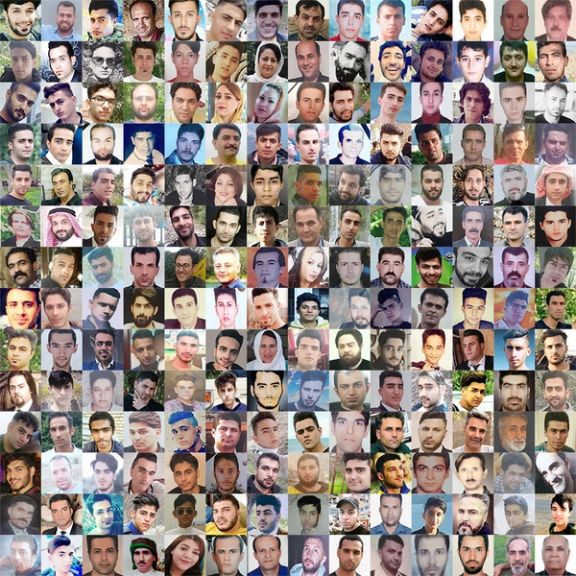
As families of victims and ordinary people mark the 4th anniversary of the brutal crackdown on demonstrations in Iran, a mother of slain protestor has spoken out.
In November 2019, week-long protests began over a sudden fuel price increase. The government shut down the internet and carried out one of the most brutal crackdowns against protesters killing 1,500 people in less than a week.
Mahboubeh Ramezani, the mother of Pezhman Gholipour, an 18-year-old protester who was killed in November 2019 has written with the publication of videos from his funeral.
“I know they killed you with a bullet, yes, my dear, they shot you in the middle of your heart.”
“Two people shot at you, you realized quickly, you understood what injustice is.”
“My Pezhman said stop being a slave and went away so that he wouldn't be enslaved,” said Ramezani.
Mahboubeh Ramezani was arrested in 2022 along with several other relatives of victims of the 2019 crackdown. She was sentenced to 100 lashes in absentia and was held in Iran’s notorious Evin Prison.
The Revolutionary Guard’s paramilitary forces, the Basij, that was deployed to suppress the demonstrations labeled the 2019 protests as "An all-out war against the regime and the Islamic revolution." The regime's response was ruthless massacre, a method it continued to employ in subsequent nationwide protests, including those sparked by public anger with the Morality Police, after the death of 22-year-old Mahsa Amini after her arrest for “improper hijab” in September 2022.

The outspoken leader of Iran's Sunnis, Mowlavi Abdolhamid, has criticized Iranian authorities for not punishing the culprits behind Zahedan’s "Bloody Friday" bloodbath.
Nearly 100 civilians, including women and children, were killed in the Sunni city of Zahedan, the capital of Sistan-Baluchistan province, during the Bloody Friday tragedy on September 30, 2022, when they came out for peaceful anti-government protests.
On the eve of Mowlavi Abdolhamid's weekly Friday sermon, security and law enforcement forces were deployed in some crossings of Sistan-Baluchistan province, human rights sources reported.
Baluch Activists Campaign group published videos of "armored bulletproof military vehicles” on the streets of Zahedan and reported snipers were stationed on a mountain near the city’s main Makki Mosque since Friday morning.
Besides Zahedan, Khash city was also experiencing a strong security and military presence, with armored vehicles deployed in the city to deal with any potential gatherings of citizens.
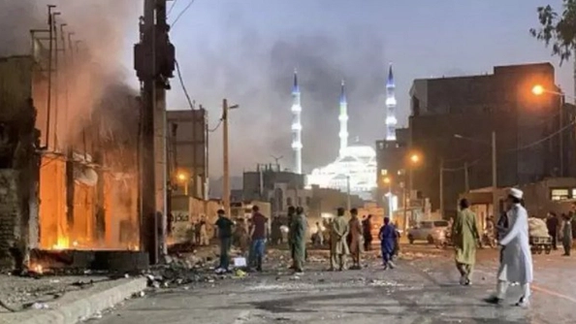
While there has not been a trial for the perpetrators of the killings of protesters, several Baloch protesters accused of attacking security forces and law enforcement have been executed.
“There are reports that some [government agents] go to the families of victims of Bloody Friday and urge them to accept ‘blood money’. The country's customs and current law prohibit this,” said Iran’s top Sunni cleric Mowlavi Abdolhamid.
As per Iran's Islamic Penal Code, a person who has committed murder can avoid the death penalty if the victim's family forgives him. In that case, they may be sentenced to prison and be required to pay "blood money" to the next of kin.
The southeastern province of Sistan-Baluchistan is among the most economically deprived parts of Iran. The province has a large Baluch population, mostly Sunnis. They have historically been among Iran's most persecuted minorities, with the highest execution rate.
“It is surprising that despite the leader's order to punish the perpetrators and leaders of this crime, it has not been followed. Our belief until now was that the leader's orders are valid, and at least those who eat the bread of sovereignty and government will follow it,” Abdolhamid said during his Friday sermon.
“It gives comfort to the families of the martyrs to know that those who committed this crime will be punished,” he continued.
The Bloody Friday protests began with worshippers gathering after a police commander sexually assaulted a young Baluch girl. The uprising became one of the bloodiest days of the uprising following Mahsa Amini's death in morality police custody.
A week-round protest has been taking place in this Sunni-majority city since then, following sermons delivered by the city's Friday prayer leader Mowlavi Abdolhamid.
In his speech on Friday, Mowlavi Abdolhamid once again asked the Islamic Republic to end discrimination and consider "national interests".